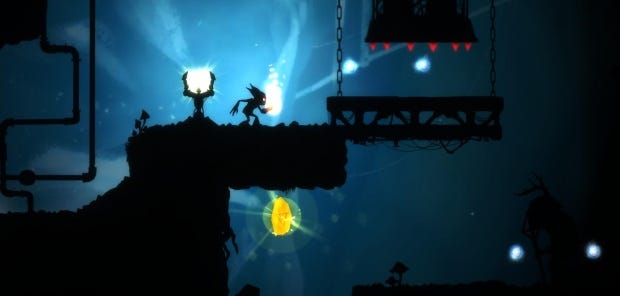Impressions: Oscura - Lost Light
Stuck in Limbo
Every now and then, like for instance whenever we communicate, Kieron Gillen and I disagree about things. One of the things we both think the other is most wrong about is Limbo. Kieron wrongly thinks it's an unfair game, echoing the failings of Rick Dangerous and its ilk by forcing you to fail. I rightly think it was a statement, an expression through these enforced failures, that crafts a uniquely interesting experience. Oscura [Steam link], despite trying to be a lot like Limbo, is not doing that. It's doing Kieron's thing.
Shadowed foregrounds against muted coloured backgrounds are not, at this point, an original aesthetic. But it's almost always a pleasing one. So while Oscura looks like any number of other shadowy platformers, it also looks lovely. There's some absolutely awful story about a kid blowing up a crystal in a lighthouse, and therefore having to collect the shards from a darkened world. It's, as is so often the case, more excuse than story. But hey ho, you head off from left to right, dodging munching cogs, angry monsters and deathly spikes. Like you've done so many times before.
Oscura's twist on the format is that each level contains coloured shards, with up to two per section, that allow you to do various things such as reverse gravity, slow down time, or make platforms appear. Crushingly unoriginal concepts, but again, perfectly acceptable platforming fare. It is, without doubt, derivative. But derivative is fine, so long as it's fun.
And that's where Oscura starts to fall apart. Running across the ground to have spikes suddenly pop up and kill you without warning isn't fun. Completing an especially tricky set of manoeuvres, leaps and dodges, to find that the point where you naturally will land pops up surprise spikes is definitely not fun. Discovering that the checkpoint before said complex manoeuvre is before a whole bunch of boring busywork jumps and dodges is extremely not fun.
But I think my largest issue with Oscura, which I'm so close to liking, is the way it deals with edges. When a platform game demands you pull off perfect moves in unforgiving environments, it's essential that deaths always be your fault. So when you land your character more on a platform than off, having him slide into lava for no sodding reason is really bloody tedious. There's a reason why games mostly have characters grab ledges when the just slide off the edge - because not doing so is really boring for the player.
Which means you've got a game that takes delight in killing you by surprise (without purpose, or statement, like the excellent Limbo), and kills you by poor design. Which, by the eighth level of the game, becomes more than I wanted to put up with.
It doesn't help that there are no in-game options, and the controller set-up in the Unity boot menu is an absolute clusterfuck. As well as pages and pages of gibberish of "joystick 3 analogue 17 - Joystick 3 axis 17" and so on, when you do eventually scroll to the controls proper, they don't match what's in-game, and indeed don't translate to what you need to press in-game. Right now, with my attempts to map things more sensibly (the defaults have you needing to hold down X or B while jumping on A, which requires curling your right index finger into a hook over the top of the face buttons), I've now got a shoulder button both activating powers and switching between them, moving things from awkward to impossible. And so, well, I'm done.
You can't launch a platform game without ensuring it's working properly on basics like 360 controllers. And your game can't be so extensively derivative without being damned close to perfect, to be worthwhile alongside all that it mimics. Oscura is probably a good fun platform game with little originality, underneath its frustrations. But just now, those frustrations are covering it up too well.
Oscura is out now on Steam, for £5.59.




